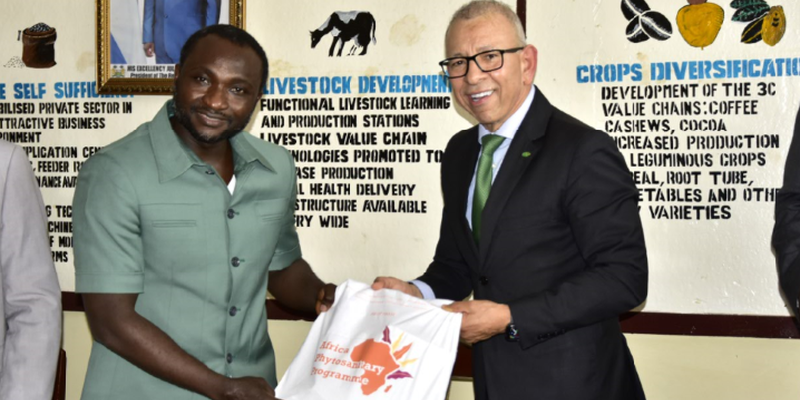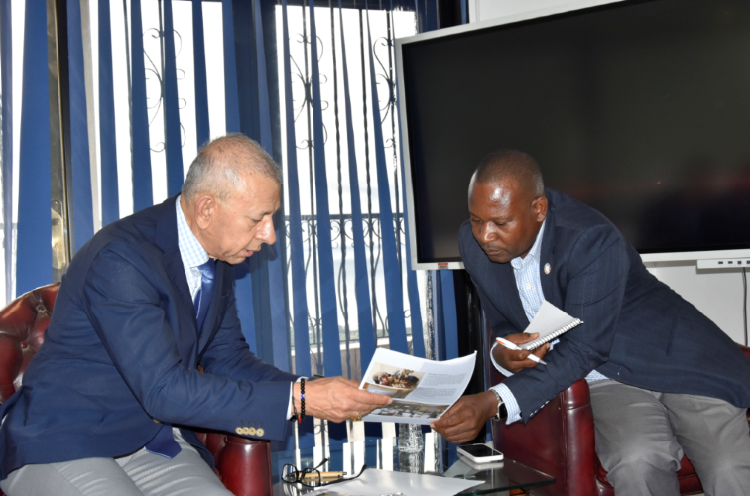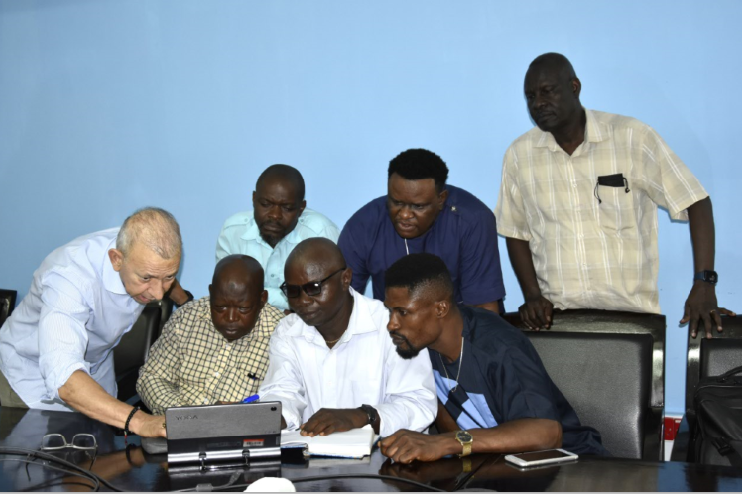Sierra Leone’s Feed Salone Initiative and the Africa Phytosanitary Programme: A strong combination for plant health and food security
Posted on Wed, 03 Jul 2024, 15:24

Henry Musa Kpaka (left), Sierra Leone’s Minister of Agriculture and Food Security, receives APP materials from Osama El-Lissy (right) IPPC Secretary / © FAO/Anita Tibasaaga
Freetown 28 June 2024. The Ministry of Agriculture and Food Security in Sierra Leone has embraced the Africa Phytosanitary Programme (APP), as a fitting approach to strengthening national capacity to prevent and control plant pests which significantly affect crops for human consumption, animal feed and trade.
Henry Musa Kpaka, Sierra Leone’s Minister of Agriculture and Food Security, underlined the APP as a delivery mechanism and direct contributor to the success of Sierra Leone’s Feed Salone programme which aims to boost agricultural productivity and catalyze economic growth, decrease food imports, alleviate hunger, increase export earnings, create jobs and build a resilient food system. Minister Kpaka spoke at a meeting with Osama El-Lissy, IPPC Secretary, during an official visit to Sierra Leone, an APP pilot country.
“This programme touches on the things we care about. You’re welcome and we’ll give you our fullest support,” said Kpaka. “In Sierra Leone, crop loss from pests is staggering and APP is about building capacity of our people and giving them the tools to prevent pests. It [APP] is action-oriented, strategic and targeted and that is what we need to be able to move productivity in the ways we say we want to”, he added.
The Minister expressed his enthusiasm and optimism in using science and technology for pest surveillance and management, for a significant impact on food security and safe trade of agricultural products. He also committed his ministry to identifying and assigning adequate phytosanitary human resources and providing the necessary leadership to implement the APP.
Secretary El-Lissy thanked the Government of Sierra Leone for developing and implementing strategic interventions, such as the agricultural transformation road map and Feed Salone to protect plant health, sustain safe trade and ensure food security. He highlighted the importance of countries adhering to international phytosanitary standards to protect agriculture and facilitate safe trade.
El-Lissy informed the minister, and the heads of various ministry departments present at the meeting that as part of APP, the IPPC Secretariat is providing countries with training, scientific tools, field supplies such as pheromones and traps and hand-held tablet computers, fitted with survey software and pest detection applications. For now, each country is receiving 50 tablets, provided through generous funding from the United States Department of Agriculture Animal and Plant Inspection Service (USDA APHIS).
“APP is a unique opportunity to produce tangible results because it is about delivery and actively fighting pests, using the best science and technology”, said El-Lissy. “We believe that APP can help Sierra Leone reduce crop loss from pests like fruit flies and therefore motivate farmers to produce more. APP is an opportunity to work together throughout the continent to make a big difference in agriculture, international trade, national economic growth and food security.
El-Lissy also met Saeed Abubakar Bancie, the representative of the Food and Agriculture Organization of the United Nations (FAO) in Sierra Leone. He also interacted with staff of the ministry’s Crop Protection Unit- the national plant protection organization (NPPO) of Sierra Leone.
 |  |
| Osama El-Lissy (right) IPPC Secretary introduces APP to Saeed Abubakar Bancie, FAO Representative in Sierra Leone | Osama El-Lissy (right) IPPC Secretary and Arop Deng (back row left) Integration and Support Team Leader at the Secretariat, guide NPPO staff during a working session |
| © FAO/Anita Tibasaaga |
Through the NPPO, Sierra Leone has developed an APP action plan, focusing on conducting surveillance for two pests of concern- Bactocera dorsalis (fruit fly) and Diastocera trifasciata (Stem girdler). Fruitflies affect mango, citrus, cucumber and watermelon while Stem girdler affects cashews. Minister Kpaka requested that Fall armyworm, which ravages maize, a vital crop for food security and animal feed in Sierra Leone, be included as well.
About APP
APP is the first-ever, continent-wide phytosanitary programme, envisioned to support all 54 African countries to prevent and manage plant pests most effectively, using science and technology. Implementation follows a phased approach and currently the pilot phase is underway in 11 African countries, namely Cameroon, Democratic Republic of Congo, Egypt, Guinea Bissau, Kenya, Mali, Morocco, Sierra Leone, Uganda, Zambia, and Zimbabwe. APP is implemented in collaboration with FAO, the African Union Department of Agriculture, Rural Development, Blue Economy and Sustainable Environment and the United States Department of Agriculture (USDA).
Related information

